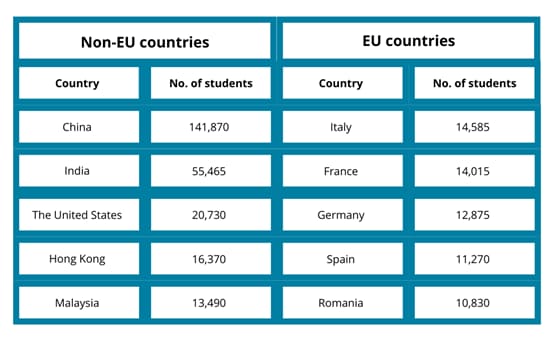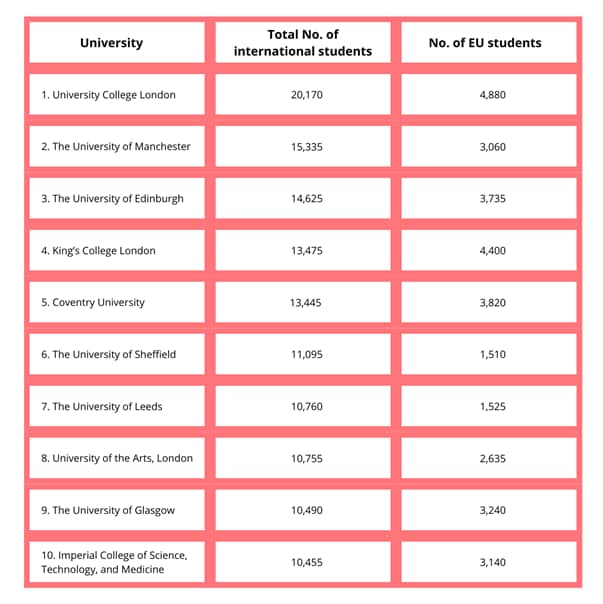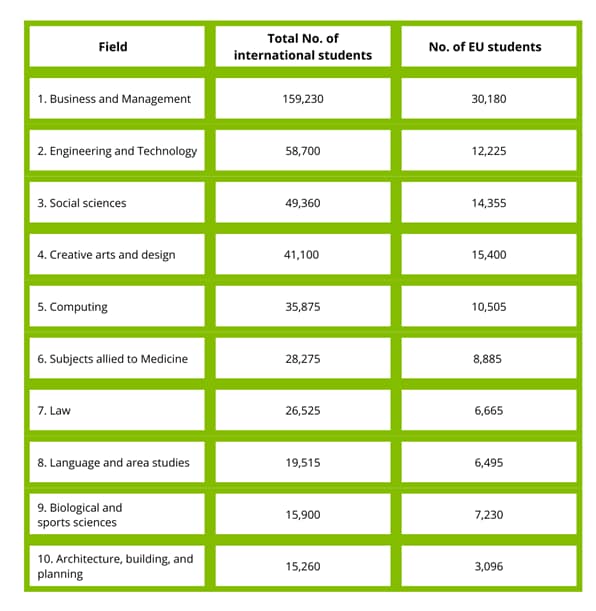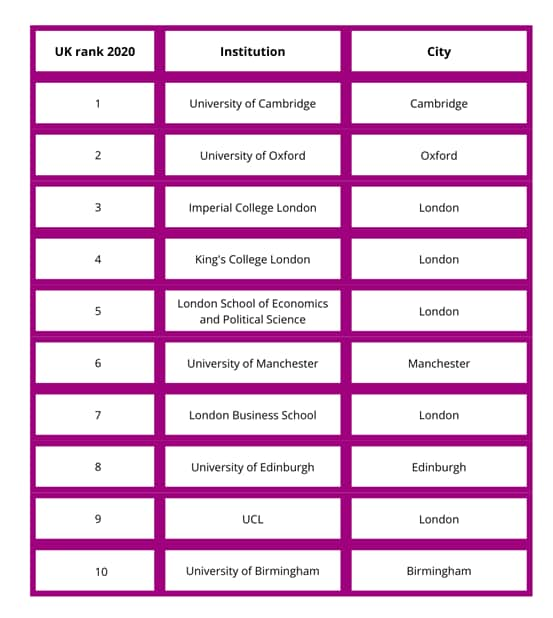Key UK trends for international student recruitment
by

The United Kingdom has been a popular international student destination for decades. Not only does living in the UK give them a great opportunity to enrich their English skills, but the country also has a great academic reputation, an open-minded culture, and lots of post-study work opportunities.
The UK has also benefited from a surge in student interest because of the closure of Australia’s borders, due to COVID-19, and the high rates of coronavirus in the US. In fact, a spring poll found that the UK is now a more popular study destination with international students than the US, Canada, Australia and Germany, thanks to the success of the UK vaccine rollout.
All these benefits of studying in the UK make it a great option for recruiters to promote to their clients.
In order to be truly effective in promoting the United Kingdom as a study destination, it’s important that you’re up-to-date with all the country’s latest international student recruitment data. If you’re aware of where international students are coming from, the universities they love, and the subjects they want to study, you’ll be better positioned to connect with new clients and meet their needs.
So, here is a breakdown of the top UK trends you need to know for international student recruitment.
The number of international students in the UK and where they’re from

According to UCAS, applications to UK universities from non-EU students increased in 2021 by 25.4% compared to 2019 application numbers, and 14.4% compared to 2020.
These increased application numbers are no surprise, given that international student numbers were at an all-time high during the last reported period (the 2019/20 academic year). The number of international students studying in the United Kingdom surpassed half a million for the first time, landing at 556,625
International students in the UK come from a wide variety of countries, but the majority of them are not from the European Union. In fact, the number of non-EU international students was 408,825 in the 2019/20 academic year.
Let’s take a look at the top 5 non-EU countries and top 5 EU countries who sent international students to study in the UK in 2019:

Caption: Data taken from: https://www.hesa.ac.uk/data-and-analysis/students/where-from
As you can see, the non-EU numbers are much more significant. The Chinese students alone surpass the number of all EU students combined.
All in all, international students from all countries made up 22% of all students enrolled in higher education in the United Kingdom during the 2019/20 academic year.
The most popular UK universities for international students

London remains a very popular city for international students pursuing their education in the United Kingdom. Tellingly, 4 out of the 10 most popular universities for international students are located in the capital.
That being said, the latest international student enrollment trends show that international students are heading for universities all over the country.
Here’s the complete list of the top 10 UK universities for international students:

Caption: Data taken from: https://www.hesa.ac.uk/data-and-analysis/students/where-from
The most popular UK university courses and subjects for international students

The desire to study in the UK for international students is especially strong at the postgraduate level. This makes sense as many students may study an undergraduate degree in their home country and then look elsewhere for further education due to career opportunities, a craving to move abroad, and the chance to perfect their professional and academic English skills.
Generally speaking, undergraduate courses are made up of a high proportion of students who are UK nationals. Postgraduate courses have a much higher percentage of international students.
Undergraduate courses
During the 2019/20 academic year, international students (EU and non-EU) made up 17% of those enrolled in full-time undergraduate courses. In the case of part-time undergraduate courses, international students made up only 5% of enrollment.
Postgraduate courses
The statistics on international student enrollment in full-time postgraduate courses are impressive. In the 2019/20 academic year, they made up a whopping 58% of total enrollment. Indeed, there seems to be a clear preference for postgraduate education when it comes to international students studying abroad.
The statistics on part-time postgraduate courses are much lower, where international students made up 10% of total enrollments.
Most popular subjects
International students study many different subjects in the United Kingdom. The following were the 10 most popular fields (EU and non-EU) during the 2019/20 academic year:

Caption: Data taken from: https://www.hesa.ac.uk/data-and-analysis/students/where-from
Indeed, the latest data shows a clear trend towards international students studying business and management in full-time postgraduate courses in the UK.
Employability
This trend makes sense when employability outcomes are taken into consideration. According to a 2019 survey from UUKI, 69% of respondents said they progressed more quickly in their careers than their peers who were educated elsewhere, and 82% of graduates say their degree was worth the investment. What’s more, 83% of respondents say their degree helped them get their job.
These responses aren’t surprising when we consider the high regard that employers have for the UK university system. Here are the top 10 UK universities, as ranked by graduate employability in 2020:

Caption: Data taken from: https://www.hesa.ac.uk/data-and-analysis/students/where-from
The median starting salary for a UK graduate is between £24,500 and £26,000. And, depending on what international students study, it could be significantly higher. For example, medicine and dentistry graduates earn a median salary of £31,500. Learn more about what graduates in the UK are likely to earn.
From the start of July 2021, international students who have completed an undergraduate or master’s degree will be able to take advantage of the Graduate Route. This allows graduates to stay in the UK for two years post-graduation to look for work and gain valuable employment experience.
Learn about the UK visa requirements for international students.
COVID-19 measures in the UK
Universities in the UK are adapting to coronavirus as the situation changes. Many universities opted to continue teaching lectures and seminars online in the autumn term. Others went for a mix of online and in-person teaching.
For students who are planning to arrive in the UK and are fully vaccinated, they no longer need to do a PCR test before arriving or quarantine on arrival. Instead, they just need to do a quick test at home on day 2 of their stay.
If a student is not vaccinated, they will need to do a pre-departure test, then two tests once they’ve arrived, while quarantining for 10 days. However, the good news is that international students are eligible for the COVID-19 vaccine once they’re in the UK.
Read the full HE operational guidance from the UK government.
More generally, COVID-19 guidelines are continuously being adapted to keep everyone safe. The rules differ slightly depending on the region of the UK.
Read the current COVID-19 guidelines for England, for Scotland, for Wales and for Northern Ireland.
How PTE Academic can help international students study in the UK
If this international student recruitment data is any indication, studying in the United Kingdom is an increasingly popular option for young people from all around the world, particularly outside the EU.
If you work with international students who are interested in studying in the UK, they’ll probably need to take an English proficiency test for admission.
Not only is PTE Academic the fastest English proficiency test out there, it’s also accepted by all UK visa and immigration applications as well as 99% of UK universities. Have a look at how PTE scoring compares to other providers of SELTS like IELTS and TOEFL.
Click here to learn how PTE Academic can help your clients achieve their goal of studying in the UK.

